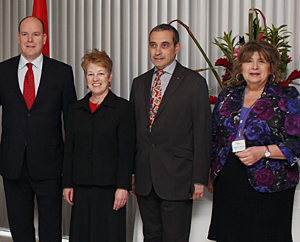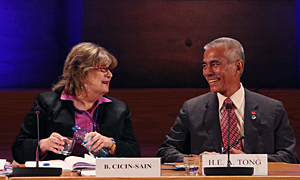
ADVERTISEMENT
- Rozovsky wins prestigious NSF Early Career Award
- UD students meet alumni, experience 'closing bell' at NYSE
- Newark Police seek assistance in identifying suspects in robbery
- Rivlin says bipartisan budget action, stronger budget rules key to reversing debt
- Stink bugs shouldn't pose problem until late summer
- Gao to honor Placido Domingo in Washington performance
- Adopt-A-Highway project keeps Lewes road clean
- WVUD's Radiothon fundraiser runs April 1-10
- W.D. Snodgrass Symposium to honor Pulitzer winner
- New guide helps cancer patients manage symptoms
- UD in the News, March 25, 2011
- For the Record, March 25, 2011
- Public opinion expert discusses world views of U.S. in Global Agenda series
- Congressional delegation, dean laud Center for Community Research and Service program
- Center for Political Communication sets symposium on politics, entertainment
- Students work to raise funds, awareness of domestic violence
- Equestrian team wins regional championship in Western riding
- Markell, Harker stress importance of agriculture to Delaware's economy
- Carol A. Ammon MBA Case Competition winners announced
- Prof presents blood-clotting studies at Gordon Research Conference
- Sexual Assault Awareness Month events, programs announced
- Stay connected with Sea Grant, CEOE e-newsletter
- A message to UD regarding the tragedy in Japan
- More News >>
- March 31-May 14: REP stages Neil Simon's 'The Good Doctor'
- April 2: Newark plans annual 'wine and dine'
- April 5: Expert perspective on U.S. health care
- April 5: Comedian Ace Guillen to visit Scrounge
- April 6, May 4: School of Nursing sponsors research lecture series
- April 6-May 4: Confucius Institute presents Chinese Film Series on Wednesdays
- April 6: IPCC's Pachauri to discuss sustainable development in DENIN Dialogue Series
- April 7: 'WVUDstock' radiothon concert announced
- April 8: English Language Institute presents 'Arts in Translation'
- April 9: Green and Healthy Living Expo planned at The Bob
- April 9: Center for Political Communication to host Onion editor
- April 10: Alumni Easter Egg-stravaganza planned
- April 11: CDS session to focus on visual assistive technologies
- April 12: T.J. Stiles to speak at UDLA annual dinner
- April 15, 16: Annual UD push lawnmower tune-up scheduled
- April 15, 16: Master Players series presents iMusic 4, China Magpie
- April 15, 16: Delaware Symphony, UD chorus to perform Mahler work
- April 18: Former NFL Coach Bill Cowher featured in UD Speaks
- April 21-24: Sesame Street Live brings Elmo and friends to The Bob
- April 30: Save the date for Ag Day 2011 at UD
- April 30: Symposium to consider 'Frontiers at the Chemistry-Biology Interface'
- April 30-May 1: Relay for Life set at Delaware Field House
- May 4: Delaware Membrane Protein Symposium announced
- May 5: Northwestern University's Leon Keer to deliver Kerr lecture
- May 7: Women's volleyball team to host second annual Spring Fling
- Through May 3: SPPA announces speakers for 10th annual lecture series
- Through May 4: Global Agenda sees U.S. through others' eyes; World Bank president to speak
- Through May 4: 'Research on Race, Ethnicity, Culture' topic of series
- Through May 9: Black American Studies announces lecture series
- Through May 11: 'Challenges in Jewish Culture' lecture series announced
- Through May 11: Area Studies research featured in speaker series
- Through June 5: 'Andy Warhol: Behind the Camera' on view in Old College Gallery
- Through July 15: 'Bodyscapes' on view at Mechanical Hall Gallery
- More What's Happening >>
- UD calendar >>
- Middle States evaluation team on campus April 5
- Phipps named HR Liaison of the Quarter
- Senior wins iPad for participating in assessment study
- April 19: Procurement Services schedules information sessions
- UD Bookstore announces spring break hours
- HealthyU Wellness Program encourages employees to 'Step into Spring'
- April 8-29: Faculty roundtable series considers student engagement
- GRE is changing; learn more at April 15 info session
- April 30: UD Evening with Blue Rocks set for employees
- Morris Library to be open 24/7 during final exams
- More Campus FYI >>
9:07 a.m., May 24, 2010----Researchers at the University of Delaware were key participants in the 5th Global Oceans Conference, which was held May 3-7 in Paris.
Organized by the UD-housed Global Forum on Oceans, Coasts, and Islands, the government of France, UNESCO, the Intergovernmental Oceanographic Commission, and 30 other organizations, the conference attracted a record 859 participants from 80 countries.
The conference provided a vital forum for high-level leaders, experts, scientists, and policy-makers to address the major policy issues affecting the oceans and to make progress in advancing the global oceans agenda, especially in light of climate change impacts recently addressed by the December 2009 U.N. climate conference in Copenhagen.
The global oceans play a unique role in sustaining life on Earth by generating oxygen, absorbing atmospheric carbon dioxide, regulating climate and temperature, and providing the global population with food, livelihood, energy, and transportation.
However, the health and well-being of the world's ocean and coastal resources are severely endangered by climate change, overfishing, pollution, and a number of other threats.
Furthermore, conference organizers have identified 183 coastal nations that face challenges such as climate change, biodiversity loss, and ocean acidification that endanger coastal and island communities and ocean-based livelihoods.
The Global Oceans Conference addressed many of the major challenges facing oceans today, with a focus on three main themes:
- Ensuring survival: oceans, climate and security;
- Preserving life: marine biodiversity; and
- Improving governance at national and regional levels and in areas beyond national jurisdiction.
To meet challenges across the three themes, outcomes of the conference focused on detailed, solutions-based recommendations that can be implemented in the near term to propel the global oceans agenda into the next decade. A summary report is available in PDF format.
Conference attendees noted the need for integrated, ecosystem-based approaches to the governance of oceans and coasts and the challenges of applying such approaches to the 64 percent of the world's oceans that do not fall within national jurisdictions.
The conference featured the participation of a number of senior-level officials including Prince Albert II of Monaco; President Anote Tong of Kiribati; Monique Barbut, CEO of the Global Environment Facility; and Maria Damanaki, European Commissioner for Maritime Affairs and Fisheries.
The Global Forum on Oceans, Coasts, and Islands is co-chaired by Biliana Cicin-Sain, professor of marine policy and director of UD's Gerard J. Mangone Center for Marine Policy in the College of Earth, Ocean, and Environment (CEOE).
The Global Forum brings together ocean leaders from governments, non-governmental and international organizations, scientists, the private sector, and museums and aquaria to achieve the sustainable development of oceans, coasts, and islands and to advance the global oceans agenda.
The Global Oceans Conference 2010 Program can be downloaded in PDF format.
For more about the Mangone Center and CEOE, visit the college's website.



